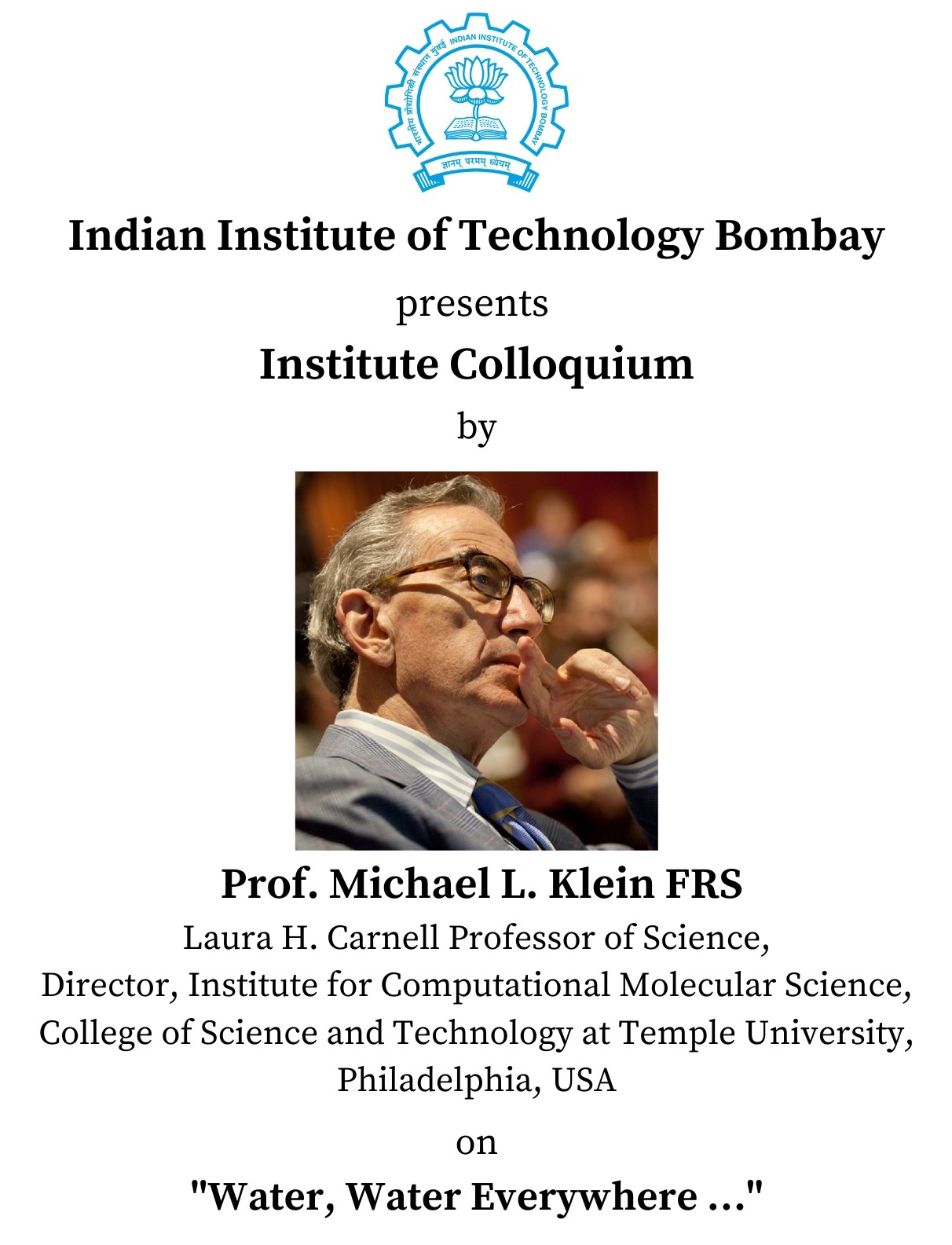Prof. B. Nag Auditorium, VMCC, IIT Bombay
The Indian Institute of Technology Bombay is organising an Institute Colloquium on Thursday, February 6, 2025.
The details of the lecture are provided below:

Title: "Water, Water Everywhere …"
Speaker: Prof. Michael L. Klein FRS
Laura H. Carnell Professor of Science,
Director, Institute for Computational Molecular Science,
College of Science and Technology at Temple University, Philadelphia, USA
About the Speaker:
Michael L. Klein received his B.Sc. (1st Class) and Ph.D. degrees in Chemistry from the University of Bristol, UK. He was a postdoctoral fellow in Italy, U.K., and the U.S.A. before joining the Chemistry Division of the NRCC in Ottawa, Canada, where he rose through the ranks from Associate to Principal Research Officer. In 1987, he returned to the United States as a Professor of Chemistry at the University of Pennsylvania. In 1993, he was made the Hepburn Professor of Physical Science and Director of the Laboratory for Research on the Structure of Matter, one of the leading materials research labs in the US. In 2009, he moved to Temple University as the Laura H. Carnell Professor of Science and Director of the Institute for Computational Molecular Science. He served as Dean of Science & Technology for over a decade (2012-2023). Klein’s research interests involve probing the structure and dynamics of molecular systems using computer simulation and modeling. Current research topics span from physical chemistry to soft matter physics and from biophysics to chemical biology. According to Google Scholar his Hirsch Index, h = 130, and his portfolio of works contains 1200 items (publications, abstracts, and reports), more than 720 of which have at least 10 citations each. (https://scholar.google.com/citations?hl=en&user=56ar4-cAAAAJ&view_op=li…)
Speaker's webpage: https://cst.temple.edu/about/faculty-staff/michael-l-klein-frs
Abstract:
Water, Water Everywhere … Michael L. Klein, Institute for Computational Molecular Science, Temple University, USA. More than two-thirds of the Earth’s surface is covered by water. Water is vital to life as we know it. But where did it come from? Recent research in the field of astronomy is offering tantalizing clues about the origins of water on planet Earth. Many books, even more review articles, and countless publications have dealt with the uniquely fascinating properties of water, which is so vital to life. After a brief overview, concerning the likely origins of water on Earth, my talk will focus on the history of modeling water, using computation. My starting point is the 1933 pioneering paper by JD Bernal and RH Fowler, which employed an intermolecular potential, based on the electronic structure of H2O, to help rationalize the known properties of water and ionic solutions. I will then discuss a paper by John Pople from the early 1950’s, which used electrostatic model of the hydrogen bonds to explain the structure of water. Next, I will transition to the era of intermolecular potentials derived by systematic fitting to experimental data; a successful multi-property parameter-fitting approach that was championed by Bill Jorgensen in the 1980’s. Then, came the important works of Michele Parrinello, with co-workers and disciples, which explored the phase space of water via so-called ab initio molecular dynamics (MD); notably with nuclei moving under the influence of forces derived from the Density Functional Theory (DFT) of electronic structure. I will then briefly discuss the critical advances in DFT, emanating from John Perdew and collaborators, which are relevant to the modeling of water. Finally, I will briefly explore the modern era, which harnesses the power of Artificial Intelligence (AI) and Machine Learning (ML) to quantitatively model the properties of water and ionic solutions. As a result of AI/ML neural network potentials, the properties of water are now accessible to quantitative modeling over the whole range of interesting temperatures and pressures, including conditions relevant to planetary interiors. Unfortunately, I will offer no new insights into the origins of water on planet Earth.
The link for live screening of the Colloquium: https://www.youtube.com/IITBombayOfficialChannel